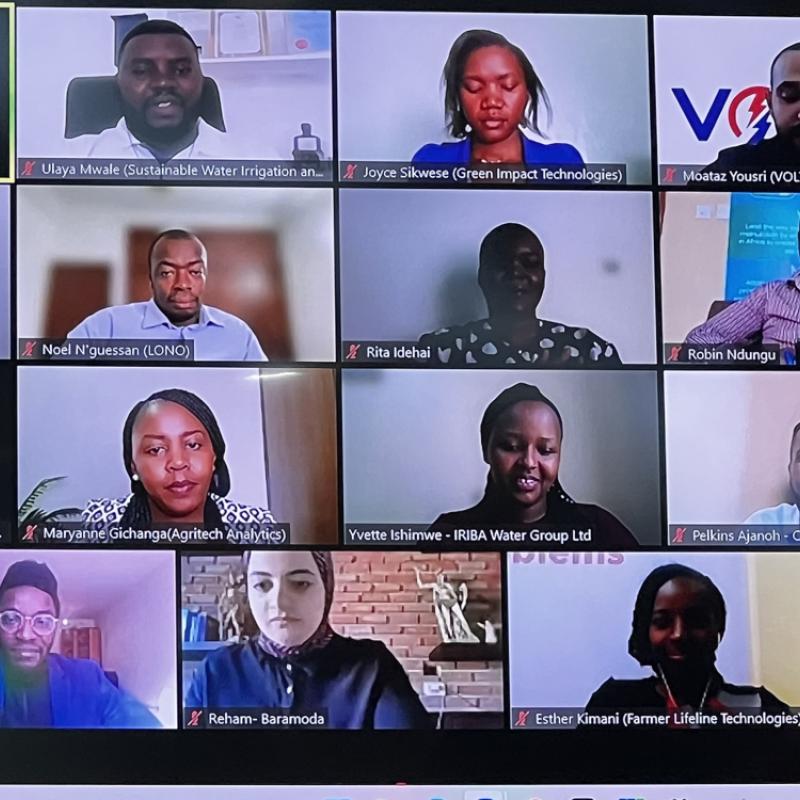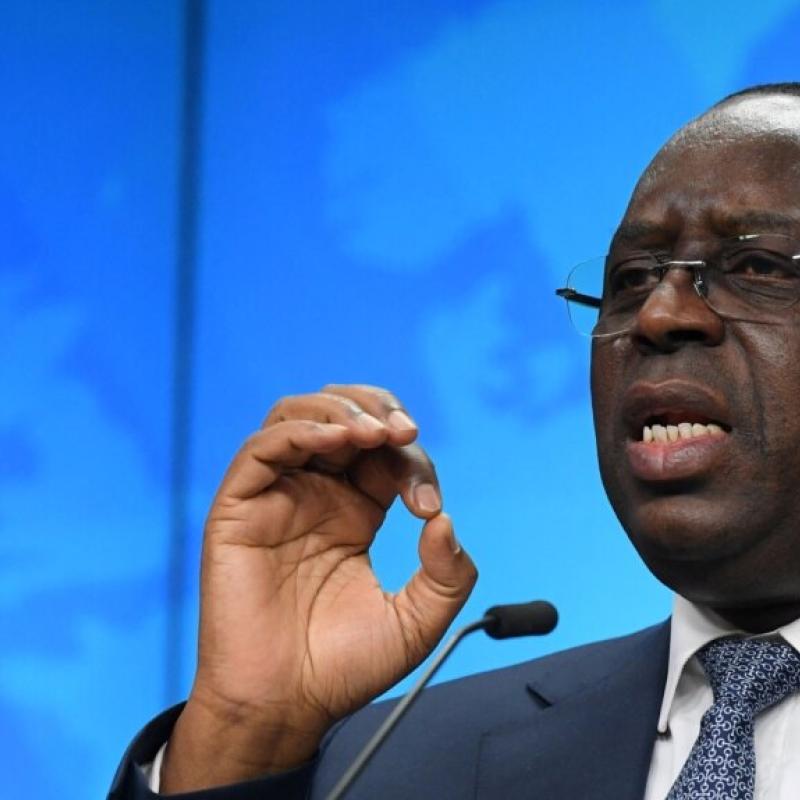
AAAP in the Media
Displaying 1 - 12 of 22
Experts share lessons learned on gender-responsive climate action during Commonwealth NDC webinar
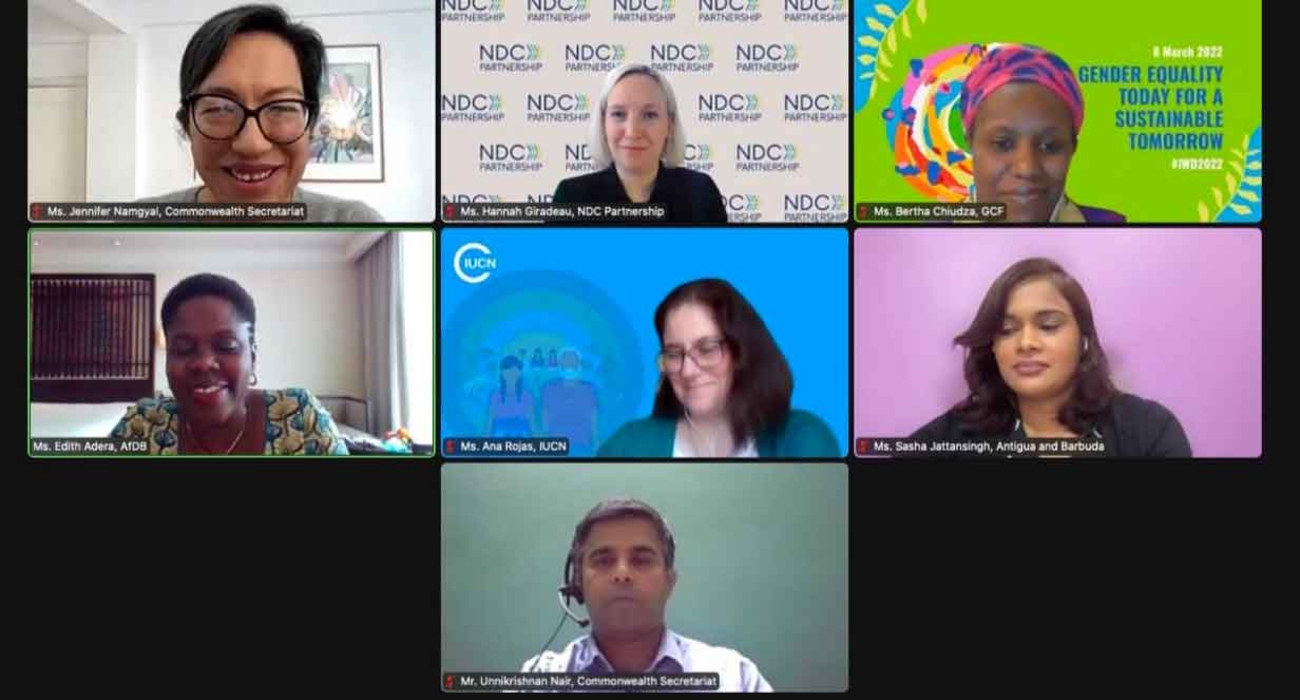
This year, Edith Ofwona Adera, Coordinator of the Africa Adaptation Acceleration Program (AAAP) and the African Development Bank’s Regional Principal Officer for Climate Change and Green Growth, marked International Women’s Day in a special way.
Adera took part in a panel discussion organised by the Commonwealth Secretariat, reflecting this year’s theme: Gender equality today for a sustainable tomorrow.
The panel, hosted by Jennifer Namgyal of the Commonwealth Secretariat, brought together experts who shared their experiences and lessons learned on integrating gender equality in Nationally Determined Contributions, or NDCs, across their respective regions and institutions. NDCs are national plans highlighting climate actions, including targets, policies and measures that governments aim to implement.
Hannah Girardeau, of the NDC Partnership Support Unit, kicked off the session with a presentation on the findings of an analysis of gender considerations in revised NDCs of the partnership’s member countries. The assessment revealed that more countries had now included the fundamental building blocks of gender-responsive climate action in their policies and plans. Girardeau noted that there is a need to invest in other critical elements such as conducting gender analyses, developing indicators, and establishing gender-responsive budgets to complement progress achieved.
Adera agreed with her. “As climate change impacts affect people differently, the responses need to be differentiated, based on identified unique needs, informed by disaggregated data,” Adera added.
To address this challenge, the African Development Bank is supporting national statistical systems in five countries through a Capacity Building for Gender Statistics and Monitoring Systems project. The project aims to produce quality, comparable and regular gender statistics to address national data gaps, strengthen monitoring systems, and integrate gender indicators across sectors.
Bertha Chiudza of the Green Climate Fund said a key requirement for all its financed activities is to ensure gender considerations are included in the development of action plans and assessments. “For its support on Nationally Determined Contributions, the Green Climate Fund ensures that gender considerations are brought in from planning and design, implementation and reporting across the sectors prioritized by countries, while ensuring inclusive stakeholder consultations,” Chiudza stated.
Sasha Jattansingh, the Commonwealth Climate Finance Adviser, gave insights into Antigua and Barbuda’s actions to mainstream gender equality into Nationally Determined Contributions. The country recognized equity issues and committed to a just energy transition with a strong focus on gender, Jattansingh noted. Antigua and Barbuda is an example of a country that has made progress in developing an inclusive renewable energy strategy that promotes socially inclusive, gender-responsive, and accessible investment opportunities.
Anna Rojas of the International Union for Conservation of Nature also shared her experiences and lessons in integrating gender into Nationally Determined Contributions, pointing out that biodiversity issues are now being integrated more consistently in these plans. She called for local-level conversations with women to tap into their strengths and rich knowledge. “Engagement with women will avoid dismal adaptation because, the more we identify needs, strengths, and solutions, the better we will be prepared,” she emphasized.
The African Development Bank is rolling out a detailed analysis of climate-gender hotspots in Rwanda. Adera said it would highlight real gender gaps and deep vulnerabilities, and how best climate interventions can address these gender issues.
Finance also emerged as one of the vital tools to promote gender equality in Nationally Determined Contributions. Innovative financial instruments and solutions must come into play when addressing gender inequalities for climate change interventions, noted Unnikrishnan Nair of the Commonwealth Secretariat.
African Youth Adaptation Solutions Challenge – Cycle 1
Through the African Youth Adaptation Solutions (YouthADAPT) Challenge, the AAAP aims to inspire and support the commercialisation of climate change adaptation solutions, driven by African youth entrepreneurs. The YouthADAPT Challenge is open to solutions (products, services, tools, or ideas) targeted at climate change adaptation and increasing resilience.
Admissible solutions can represent:
- An adaptation solutions business that has not been scaled and is not in widespread use
- An existing resilience and adaptation solutions business or product
- A commercially viable means to raise awareness or scale uptake of specific adaptation solutions.
Applicants must be 18–35 years old and registered and operating in Africa. Their venture must be youth-led while delivering climate adaptation or resilience solutions addressing a real-life challenge. 50% of the finalists will be women-owned or women-led enterprises. Winners will receive a business grant of up to $100,000 and the opportunity to further develop their ventures through business support and acceleration.
The Cycle 1 (2021) winners were unveiled at COP26 in Glasgow, United Kingdom, in a ceremony held at the Africa Pavilion. They include Mumita Holdings Limited, Cameroon, Salubata Technological Innovations Limited, Nigeria, Sustainable Builders, Zambia, Global Farms and Trading Company Limited, Ghana, Miama General Dealers Limited, Zambia, Kimplanter Seedling and Nurseries Limited, Kenya, Irri Hub Ke Limited, Kenya, Soupah Farm en- Market Limited, Nigeria, Simkay Green Global Ventures, Nigeria and Bleaglee Waste Management Limited, Cameroon.
The YouthADAPT Challenge aims to support youth-led enterprises to accelerate and scale-up innovative solutions for climate adaptation and resilience that will also lead to decent jobs for youth. The solutions target key environmental, social, and economic sectors affected by climate change, with a clear value proposition to scale up for greater impact and to create specified direct jobs.
The Challenge aims to strengthen inclusive growth and broaden investment and economic opportunities for youth in Africa through entrepreneurial skills development by providing training, mentorship, and financing to youth-led businesses (50% women-owned). The first edition of the awards was launched on 06 September 2021.
- Provide a financial contribution to cover the cost of program implementation and 50% of grant funding
- Participate in project missions and field visits to review progress with select beneficiary enterprises
- Support the project team to provide clarity on climate change adaptation and resilience in the training component, including tracking the creation of adaptation jobs
- Coordinate project monitoring and evaluation.
- The most innovative youth-owned enterprises on the continent are scaled up
- The viability of selected businesses is improved, to help sustain their impact on climate change adaptation
- Inclusiveness promoted through 50% of the selected businesses being led by women.
- Young innovators and MSMEs equipped with customised business development skills and resources;
- The short-term growth of youth-owned enterprises supported, with links to private equity and loan products for longer term growth.
- Expansion of partnership, knowledge sharing, exchange and learning created through a network of youth entrepreneurs in Africa.
- Inclusive growth, investment and economic opportunities for youth are strengthened through entrepreneurial skills development;
- Adaptation, innovation and jobs integrated and for jobs;
USD 1,000,000
Insurance Technical Support to Africa Adaptation Acceleration Programme (AAAP)
Countries in the Horn of Africa (HoA) are vulnerable to climatic shocks and their impact can have a devastating effect on agricultural production. The most vulnerable regions are arid and semi-arid areas that receive low rainfall and depend on pastoralism as the main economic activity. Elevated levels of food insecurity and conflict resulting from increased competition for pasture and water among pastoral communities is a concern for governments of HoA countries.
Strategies for increasing resilience need to be customized to different sub-regions and microclimates. Initiated in 2019, The Horn of Africa Initiative brings together 6 countries – Djibouti, Kenya, Ethiopia, Eritrea, Somalia and Sudan – to deepen economic integration and promote regional cooperation. The countries agreed that regional cooperation and economic integration should remain key to the overall recovery efforts of the sub-region.
The project described here focused on “Identifying Climate-Smart Digital Opportunities with Scaling Potential under the Horn of Africa Initiative”.
The findings in this report will contribute towards achieving the objectives of the HoA programme, which include:
-
Strengthening the resilience of pastoral and agro-pastoral production systems to climate change
-
Enhancing agribusiness and enterprise across value chains
-
Strengthening climate services and applications for enhanced adaptive capacity
This report was intended to contribute to the project design by ensuring that activities supporting investments under the HoA programme maximize complementarity around the application of digital technology to ensure efficiency, quality and real-time exchange of data, advisories and related services.
The report was also designed to produce a number of recommendations towards the identification of climate-smart digital opportunities; for example, the importance of establishing strong coordination mechanisms to implement digital solutions at a regional scale.
An in-depth understanding of the existing climate-smart digital opportunities with scaling potential under the HoA Initiative, including (but not limited to):
-
Emerging insurance innovations
-
Mainstreaming digital solutions to climate risk finance into country programmes
-
Application of digital technology to solve challenges in delivering agricultural insurance
-
Critical success factors for a successful regional drought insurance scheme
The output of this report advances the objectives of the Africa Adaptation Acceleration Programme (AAAP) of GCA and the African Development Bank, which was developed to help implement the vision of the Africa Union’s Adaptation Initiative. To accelerate adaptation, the AAAP will use a triple-win approach and implement climate resilience activities that address COVID-19, climate change and the economy. AAAP intends to mobilize over US$25 billion to support adaptation between 2020–2025.
N/A
Inclusive Insurance for Smallholder Farmers in Africa
Rising average temperatures, longer heat waves, more extreme precipitation events and locust invasions are just some of the adverse effects of climate change that will impact agriculture in Africa. Climate change is expected to cause a decrease in crop productivity due to increased heat and drought. Some crops are likely to be particularly at risk, such as cotton in Côte d'Ivoire or Ghana. This phenomenon will directly impact the population, with greater consequences for the most vulnerable famers.
In the face of rising climate risk across Africa, insurance is a key adaptation measure to strengthen food security and ensure climate resilience. However, the agricultural insurance market is nascent, particularly in sub-Saharan Africa, where less than 3% of farmers are protected.
The underdevelopment of agricultural insurance in Africa is due to a variety of factors, including the lack of organization in local value chains, the low profitability potential of programmes, and a general lack of financial resources and knowledge about insurance. Also, farmers do not consider agricultural insurance to be a priority.
The key aim of the landscape study on Inclusive Insurance for Smallholder Farmers in Africa was to clarify the pathway for the Global Center on Adaptation (GCA) to enter the agriculture insurance market in Africa. The study will contribute to defining the insurance toolkit included in the Smallholder Adaptation Accelerator (SAA) from the Climate Smart Digital Agriculture Pillar of the Africa Adaptation Acceleration Program (AAAP), a joint programme in cooperation with the African Development Bank (AfDB).
The landscape study, completed in December 2021, describes the current state of the agricultural insurance market in Africa and considers (i) the various approaches available to scale up agricultural insurance; (ii) the types of insurance product that could be created; (iii) whether insurance premiums should be subsidized; and (iv) how digital technologies and effective relationships with local partners could be leveraged to facilitate product design and distribution.
This landscape study aimed to achieve:
- A synthesis of market knowledge, including key trends in the African insurance market and the challenges to development of the market
- In-depth product knowledge, including of parametric insurance and digital innovations
- An understanding of the various potential insurance schemes and an awareness of the challenges in distribution
- A clear set of recommendations for the creation of an insurance product for smallholder farmers.
The outcomes of this landscape study should contribute to:
- The identification of priority countries to launch a pilot for a smallholder insurance product.
- The involvement of GCA either as a partner in an existing programme insuring smallholders in a country in sub-Saharan Africa, where the population is connected and digitally active, with a stable government willing to support an insurance programme; or as the catalyst for a new agricultural parametric insurance programme.
- The initiation of a four-step workplan: (i) a feasibility study; (ii) a business agreement; (iii) product design and validation; and (iv) enrolment of farmers into the scheme.
- Once established, the evolution of the insurance cover and type of product over time; for example, from drought index insurance for maize, to a hybrid product for maize, to a hybrid product for maize and cassava.
100000
African Youth Adaptation Solutions Challenge – Cycle 2
YouthADAPT is an annual competition that invites young entrepreneurs and micro, small, and medium enterprises in Africa to submit innovative solutions and business ideas that have the potential to drive climate change adaptation and resilience across the continent.
Through YouthADAPT, the AAAP aims to inspire and support the commercialisation of climate change adaptation solutions, driven by African youth entrepreneurs. The YouthADAPT Challenge is open to solutions targeted at climate change adaptation and increasing resilience.
Solutions can represent:
- An adaptation solutions business that has not been scaled and is not in widespread use
- An existing resilience and adaptation solutions business or product
- A commercially viable means to raise awareness or scale uptake of specific adaptation solutions.
The second edition of the African Youth Adaptation Solutions (YouthADAPT) Challenge was launched in September 2022. Winners will receive a business grant of up to $100,000 and the opportunity to further develop their ventures through business support and acceleration.
The YouthADAPT Challenge aims to support youth-led enterprises to accelerate and scale-up innovative solutions for climate adaptation and resilience. The solutions target key environmental, social, and economic sectors affected by climate change, with a clear value proposition to scale up for greater impact and to create specified direct jobs.
YouthADAPT aims to strengthen inclusive growth and broaden investment and economic opportunities for youth in Africa through entrepreneurial skills development by providing training, mentorship, and financing to youth-led businesses (50% women-owned). The first edition of the awards was launched on 06 September 2021.
- Provide a financial contribution to cover the cost of program implementation and 50% of grant funding
- Participate in project missions and field visits to review progress with select beneficiary enterprises
- Support the project team to provide clarity on climate change adaptation and resilience in the training component, including tracking the creation of adaptation jobs
- Coordinate project monitoring and evaluation.
- The most innovative youth-owned enterprises on the continent are scaled up
- The viability of selected businesses is improved, to help sustain their impact on climate change adaptation
- 50% of the selected businesses are led by women.
- Young innovators and MSMEs equipped with customised business development skills and resources.
- The short-term growth of youth-owned enterprises is supported, with links to private equity and loan products for longer term growth.
- Expansion of partnership, knowledge sharing, exchange and learning through a network of youth entrepreneurs in Africa.
- Inclusive growth, investment and economic opportunities for youth;
- Adaptation, innovation and jobs integrated and for jobs;
Total: USD 1,400,000
Budget for Knowledge Partner (Project Implementation Cost) - USD 400,000
Grant Awards (50% of total grant awards) – USD 1,000,000
2022 Disbursement:
60% Disbursement of Project Implementation Cost to Knowledge Partner – USD 240,000
50% of Grant Awards – USD 500,000
Global Leaders Rally Support and Finance for the Africa Adaptation Acceleration Program to Tackle Climate Change in Africa
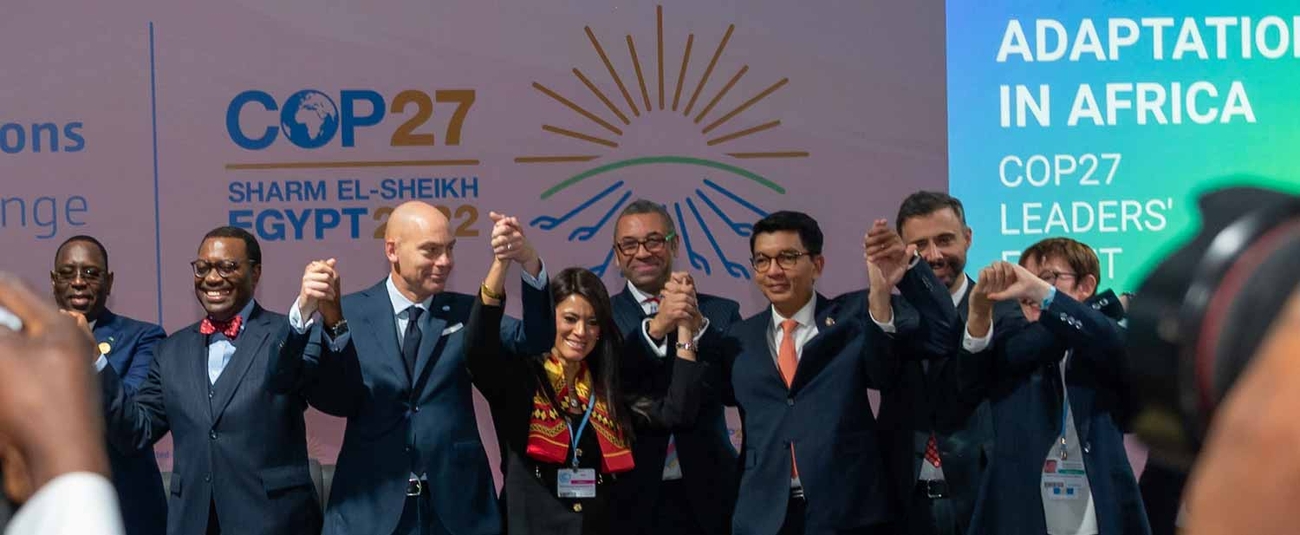
Global leaders on Tuesday rallied around climate adaptation for Africa. They attended the Africa Adaptation Leaders’ Event, convened by African Union Chair President Macky Sall of Senegal, Global Center on Adaptation CEO Patrick Verkooijen, and African Development Bank Group President Akinwumi Adesina.
The event took place at the global climate summit (COP27) in Sharm El-Sheikh, Egypt. It underscored the critical need for climate adaptation in Africa and responded to the call for the capitalization of the Africa Adaptation Acceleration Program (AAAP).
“This is a pivotal step in the fight against climate change,” African Union Chair President Macky Sall said. “The commitments made by Africa’s partners will give the Africa Adaptation Acceleration Program the boost that it needs to transform the development trajectory of the world’s most climate exposed continent. I am confident in the ability of the AAAP to deliver results for Africa.”
The Africa Adaptation Acceleration Program is an Africa-owned and Africa-led initiative developed by the Global Center on Adaptation (GCA) and the African Development Bank (AfDB) in close collaboration with the African Union. It serves as the implementation of the Africa Adaptation Initiative (AAI) to mobilize $25 billion to implement, scale and accelerate climate adaptation across the Africa. Since 2021, AAAP has mainstreamed climate adaptation in over$3.5 billion of investments in 19 countries.
United Nations Secretary-General António Guterres said: “I want to express my total solidarity for the Africa Adaptation Acceleration Program […] I urge the international community to support Africa to mobilize the technical & financial resources for scaling up transformative adaptation.”
“With this innovative program, Africa has developed a plan to grow, create jobs and opportunities for people, and to be resilient against the climate crisis,” said President Akufo-Addo of Ghana. “AAAP’s singular focus on the issue of climate adaptation will also contribute to greater stability and progress in Africa and around the world. AAAP is aligned with Ghana’s plans to address climate change as it chairs the Climate Vulnerability Forum (CVF) to lead efforts from the world’s most climate vulnerable countries to spur and mobilize investment through the Climate Prosperity Plans."
James Cleverly, Secretary of State for Foreign, Commonwealth and Development Affairs of the United Kingdom announced that the UK will provide £200 million to the African Development Bank’s Climate Action Window. This is in addition to the £20 million announced at COP26 in Glasgow to the AAAP Upstream Financing Facility.
Cleverly noted: “Climate change is having a devastating impact on countries in Sub-Saharan Africa facing drought and extreme weather patterns, which have historically received a tiny proportion of climate finance. This new mechanism […] will see vital funds delivered to those most affected by the impacts of climate change, much more quickly.”
Prime Minister Mark Rutte of the Netherlands followed through on the commitment made at the Africa Adaptation Summit held at the Global Center on Adaptation in September to confirm that the Netherlands will contribute EUR110 million to the AAAP, with EUR10 million in support for the Upstream Financing Facility hosted by GCA and EUR 100 million for the Climate Action Window of the African Development Fund at the African Development Bank as part of the Netherlands’ commitment to dedicate half of its climate funding, fully grant based, to climate adaptation, with a focus on Africa.
Norwegian Prime Minister Jonas Gahr Støre echoed African leaders’ calls for countries to rapidly scale up finance for climate adaptation, stating: “The climate crisis is here and now. Years of progress are at risk.”
“The AAAP Upstream Financing Facility is the delivery mechanism of adaptation and will use millions to leverage the billions that is required for adaptation,” he continued. “AAAP projects will generate effective climate adaptation outcomes. Adaptation is a growth agenda. A jobs agenda. And a prosperity agenda. On behalf of Norway, I am looking forward to continuing this partnership, investing in it, and supporting it with the Global Center on Adaptation.”
International Monetary Fund Managing Director Kristalina Georgieva emphasized the need to accelerate adaptation in Africa, stating: “It is paramount to support Africa’s adaptation because Africa will not reach its tremendous potential without it. AAAP complements the IMF’s Resilience and Sustainability Trust, which helps countries address external shocks such as climate change and ensure sustainable growth that can give Africa a chance to leapfrog outdated development models.”
African Development Bank Group President Dr. Akinwumi Adesina said: “Africa is suffering from the devastating effects of climate change. Our continent is being short changed by climate finance. The contributions towards the Africa Adaptation Acceleration Program’s Upstream Financing Facility and the Climate Action Window – which the African Development Bank manages – will help capitalize the program. With increased capital, we can better deliver the investment needed to bridge the adaptation finance gap. We want to ensure that the most vulnerable communities can benefit from a sustainable and prosperous future.”
Endorsing the outcomes of the high-level meeting, Patrick Verkooijen, CEO of the Global Center on Adaptation, closed with a statement emphasizing the AAAP’s impact to date, noting that “there is no pause button on the climate crisis. Africa must adapt to the threat of climate change, and it must adapt now.”
“Through the AAAP,” he continued, “Africa has charted its path towards a climate-resilient future for its youth, its economic growth, and for its prosperity.”
About the Global Center on Adaptation
The Global Center on Adaptation (GCA) is an international organization which works as a solutions broker to accelerate action and support for adaptation solutions, from the international to the local, in partnership with the public and private sector, to ensure we learn from each other and work together for a climate-resilient future. Founded in 2018, GCA is hosted by the Netherlands, working from its headquarters in Rotterdam with a knowledge and research hub based in Groningen. GCA has a worldwide network of regional offices in Abidjan, Côte d’Ivoire, Dhaka, Bangladesh and Beijing, China. Through this evolving network of offices and global and regional GCA teams, the organization engages in high-level policy activities, new research contributions, communications, and technical assistance to governments and the private sector.
About the African Development Bank
The African Development Bank Group is Africa’s premier development organization. Its overarching objective is to spur sustainable economic development and social progress in its regional member countries, thus contributing to poverty reduction across the continent.
The Bank Group achieves this objective by mobilizing and allocating resources for investment in African countries and providing policy advice and technical assistance to support development efforts.
In 2015, all multilateral development institutions agreed on the same set of objectives, the United Nations Sustainable Development Goals.
Learn more: https://www.afdb.org/
About the Africa Adaptation Acceleration Program
The Africa Adaptation Acceleration Program (AAAP) is a joint initiative of the African Development Bank and the Global Center on Adaptation (GCA). It aims to mobilize $25 billion, over five years, to accelerate and scale climate adaptation action across the continent. This ambition is delivered through the AAAP Upstream Financing Facility managed by the Global Center on Adaptation and the African Development Bank’s climate action window in the ADF replenishment. AAAP works across four pillars to achieve transformational results: Climate-Smart Digital Technologies for Agriculture and Food Security; African Infrastructure Resilience Accelerator; Youth Empowerment for Entrepreneurship and Job Creation in Climate Adaptation and Resilience and Innovative Financial Initiatives for Africa. AAAP has already guided over $3.5 billion of upstream investments in 19 countries with every dollar spent influencing $100 downstream.
COP27 - COP27 Leaders' Event, Accelerating Adaptation in Africa (DAY 2)
African and other global leaders meeting in Rotterdam say the continent is at a tipping point for climate adaptation action
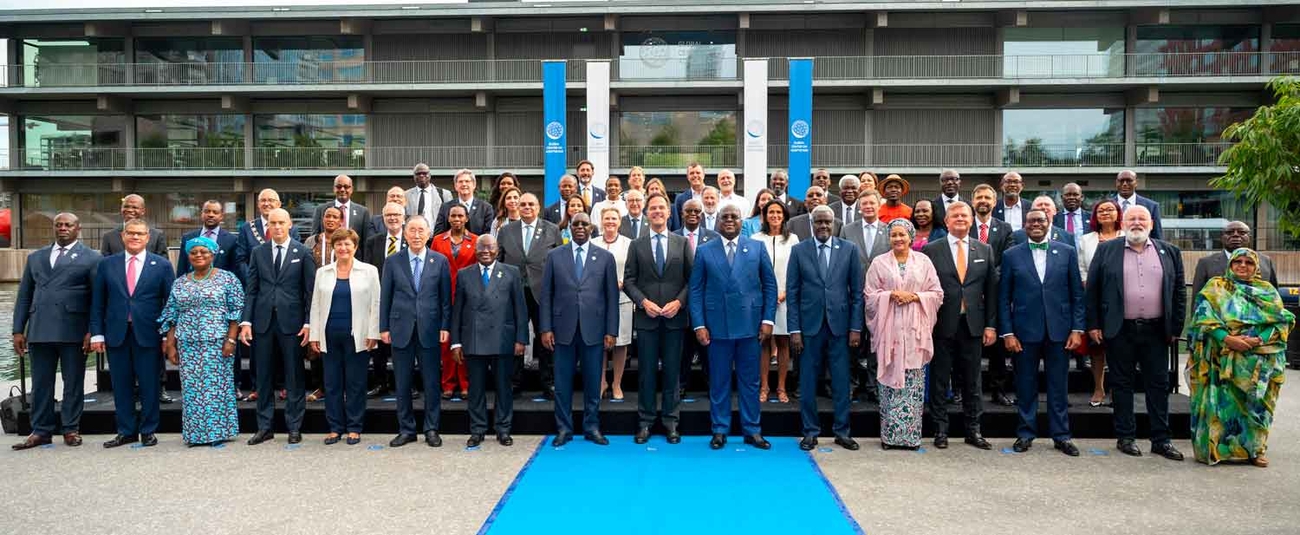
Two months to the 27th global climate summit (COP27) in Sharm El-Sheik, Egypt, African and other global leaders have rallied in Rotterdam, to highlight the urgency of climate adaptation funding for the continent.
The meetings—co-convened by the President of the African Development Bank Group Dr Akinwumi Adesina, CEO of the Global Center on Adaptation (GCA) Professor Patrick Verkooijen, and African Union Commission Chair Mousa Faki Mahamat—was unanimous about the need for concrete action and finance.
Former UN Secretary General Ban Ki-moon and GCA Co-Chair said: “The world has a fever. It burns hotter and higher with every day that passes… Statistics tell us that Africa is where the fever is at its most intense and people at the most vulnerable.”
GCA Co-Chair and Honorary Chairman of Royal DSM Feike Sijbesma spoke about the importance of support from the global private sector. He said 80% of the funding for adaptation needs to come from the private sector in both the developed north and the developing south.
GCA Chief Executive Officer Patrick Verkooijen emphasized the disastrous impacts of climate change hitting all parts of the world. He said it is in Africa, however, that climate shocks will hit the hardest. He said Africa was resolute about its economic advancement and would not stop. “Adaptation in Africa is like climbing a mountain. With all of you here today, we have the dream team that will climb the mountain together.”
Verkooijen added: “The next summit after today is Sharm El-Sheikh, the Africa COP. But success in Egypt will hinge on whether Africa’s needs are met or not. Africa has the commitment and the plan. That plan is the Africa Adaptation Acceleration Program (AAA-P). It is Africa-developed and Africa-owned. It was launched by Africa’s leaders, who are here today. It is the vehicle for delivering the Africa Adaptation Initiative.”
Established in 2020 by the GCA and the African Development Bank, the Africa Adaptation Acceleration Program lies at the center of climate action on the African continent. Participants acknowledged Verkooijen’s and Adesina’s joint efforts as the driving forces behind the program.
African Union Chairperson, President Macky Sall of Senegal, President Nana Akufo-Addo of Ghana, who is Chair of the Climate Vulnerable Forum, and President Felix Tshisekedi of the Democratic of the Congo conveyed a unified message: the international community must deliver on its pledge to double adaptation finance and to scale adaptation action for Africa.
President Sall expressed disappointment at the absence of industrialized country leaders at the summit. The African Union Chair said if African leaders could be in Rotterdam in person to discuss such a crucial issue as climate adaptation in Africa, the very least they expected was that their European counterparts—whose countries are among the world’s biggest polluters—would also have been present at the summit.
This sentiment was shared by Presidents Akufo-Addo and Tshisekedi, African Union Commission Chairperson Moussa Faki Mahamat and UN Deputy Secretary General Amina Mohammed, among others. Mohammed said: “A bird only flies with two wings, and the representation at this table is lopsided.”
The UN deputy chief added that it was not Africa’s fault that it is in its current position, given that it contributes very little to global carbon emissions. She pondered on what the situation would have been if the roles had been reversed. Mohammed said the COP26 Glasgow pact was at risk of failing if the developed world did not make good on its promises of delivering $100 billion a year for climate action in developing countries.
In his intervention(link is external), Adesina reminded participants that the African continent was warming faster than any other region of the world, as predictions from the Intergovernmental Panel on Climate Change show that the critical global warming levels will be reached much earlier in Africa.
The African Development Bank chief explained that in the face of the deluge, Africa does not have the resources to tackle climate change. He said the continent receives only 3% of global climate financing. He noted that if this trend continued, Africa’s climate financing gap could reach between $100 billion to $127 billion per year through 2030.
Adesina said: “The current climate financing architecture is not meeting the needs of Africa. New estimates by the African Economic Outlook of the African Development Bank show that Africa will need between 1.3 and 1.6 trillion dollars from 2020 to 2030, or $118 billion to $145 billion annually to implement its commitments to the Paris Agreement and its nationally determined contributions.”
The African Development Bank chief said the African Adaptation Acceleration Program’s upstream facility at the GCA had already helped to generate $3 billion of mainstreamed climate adaptation investments by the African Development Bank, from agriculture to energy, transport, water, and sanitation.
Adesina spoke of the African Development Bank’s African Development Fund (ADF), its concessionary lending arm as one of the ways to address the climate financing gap. He said the 16th replenishment of the fund, currently underway, presented a unique opportunity for full financing of the $12.5 billion in financing for the Africa Adaptation Acceleration Program.
The African Development Bank chief explained that the African Development Fund had introduced a Climate Action Window that would hopefully mobilize $4 billion to $13 billion for climate adaptation for the Fund’s member countries. “This will be used to support 20 million farmers with access to climate resilient agricultural technologies, access of 20 million farmers and pastoralists to weather-indexed crop insurance, reviving 1 million hectares of degraded land, and provision of renewable energy for about 9.5 million people.
Adesina said commitments by developed countries to provide $100 billion annually in climate finance for developing countries was long overdue. “Africa cannot wait,” he emphasized. “This is the time to support the Africa Adaptation Acceleration Program. This is the time to support the ADF 16th replenishment. This is the time to support the Climate Action Window of ADF-16.”
World Trade Organization Director General Ngozi Okonjo-Iweala also lent her voice to the clarion call for additional resources for Africa adaptation funding. Speaking about the role of trade in climate adaptation, she said trade policies should be integrated into global climate action as an amplifying force for financing and other climate-related support provided to vulnerable economies.
The summit’s five-point Communique(link is external) highlighted that Africa was at a tipping point. It emphasized that success at COP27 will depend on whether the needs of Africa, the world’s most climate-vulnerable continent, are met with finance flowing into such key country-led adaptation programs as the Africa Adaptation Acceleration Program.
GCA Co-Chair Feike Sijbesma said in closing: “Investments in global climate adaptation cooperation are a big opportunity for countries like the Netherlands to share some of our best innovations with those who need them the most. The AAAP will be a crucial vehicle for triggering far greater business investment across Africa into green and resilient solutions. This is a collective effort, we need every sector, every contribution possible to see off the climate crisis in Africa, and the private sector, in particular, has a massive role to play.”
Unlock the impact potential of agricultural SMEs in Africa, experts urge at Dakar 2 Food summit
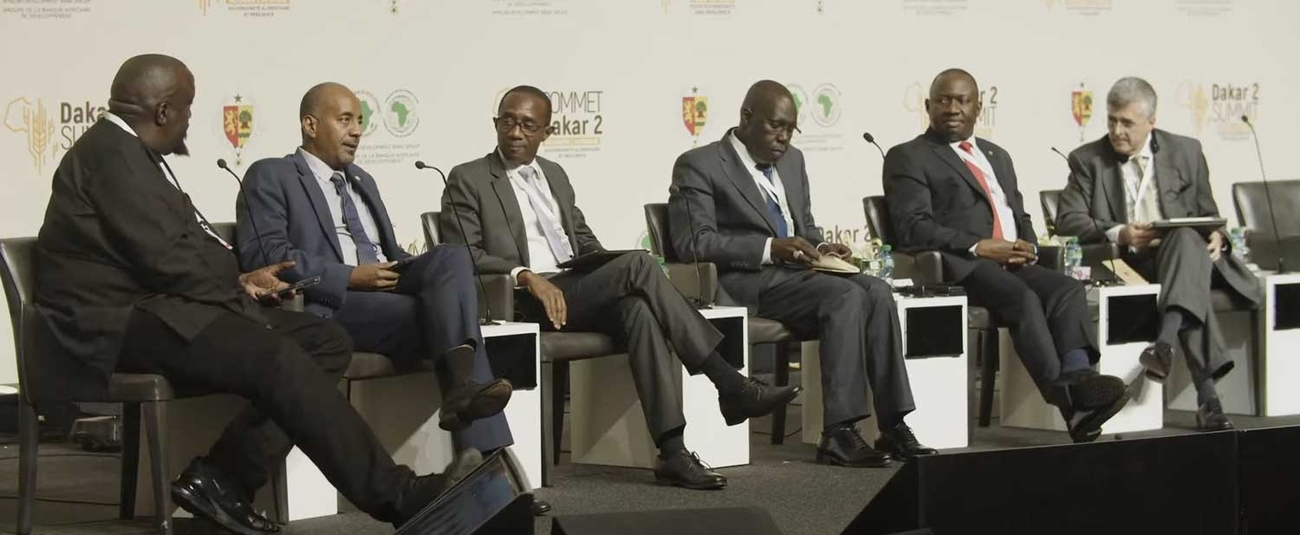
Global experts meeting during a panel session at the second international summit on food production in Dakar called for accelerated avenues to close the financial gap in agriculture and address barriers to the growing finance market for agricultural Small and Medium Enterprises (SMEs).
The discussions come in the wake of supply chain disruptions as a result of COVID-19 pandemic, the war in Ukraine, rising inflation, high commodity prices that have led to increased food and nutrition insecurity.
The session, titled, Closing the Financing Gap was moderated by Alan Kasujja, Presenter, BBC World Service.
At the summit, the African Development Bank Group and the Government of Canada announced the establishment of a new special fund to support Africa’s small and medium-sized enterprises (SMEs) in the agriculture sector.
The Agri-food SME Catalytic Financing Mechanism aims to catalyze and de-risk investment for agriculture SMEs. It will also strengthen agricultural value chains and improve food security across the continent.
The experts urgedlenders to explore blended finance to help de-risk agricultural transactions, reduce transaction costs and attract private financing by improving the risk-return ratios.
“A key challenge of the sector is the understanding of the risks…We need blended finance for things that are riskier to be done,” said Wagner Albuquerque de Almeida, Global Director for Manufacturing, Agribusiness and Services at the International Finance Corporation (IFC).
Trade and Development Bank head Admassu Tadesse said financing agriculture is not as risky as is often perceived. “It depends on which part of the cycle. We focus on the tail end, where is there is low risk,” he said.
Agri-SMEs’ biggest sources of financing are local commercial banks. However, banks prefer to invest in larger, more mature enterprises such as established aggregators and local processors who command regional or national market, Tadesse noted.
Danladi Verheijen, Co-founder and CEO of Verod Capital, a private equity investment firm, stressed that agriculture should be seen as an investment opportunity.
“Investors want to get in where there are high returns,” he said. He noted that one of the challenges in agriculture is finding the scale of businesses attractive enough for financial intermediaries to engage with them.
Panelists also noted that food value chains in Africa are currently not set up to maximise the potential of our food system. This growing realization has jolted players in Africa’s agricultural sector to seek practical solutions to restore the continent’s food security.
There is vast potential for establishing production and trade links, as well as synergies between different actors along the entire agribusiness value chain : producers, processors and exporters.
“All the elements need to come together. You need to have an ‘airbag’ if things go wrong,” said Dr. Heike Harmgart, Managing Director for the Southern & Eastern Mediterranean, European Bank for Reconstruction and Development.
Speakers also urged farmers and agri-SMEs to “reclaim their power” through cooperatives. “We need to help them to be organised to create clusters, and cooperatives and to create a sense of professionalization into the sector”, said Albuquerque de Almeida
Agreeing with Almeida, Dr. Olagunju Ashimolowo, the Vice President, Operations for ECOWAS Bank for Investment and Development urged governments to identify cooperatives to manage farmers. He also asked livestock owners to properly channel the funds in a way that would be “attractive and bankable.”
The African Development Bank’s Africa Adaptation Acceleration Program (AAAP) digital agriculture annex is deploying digital technologies targeted at smallholders, agri-SMEs and value chain actors to build actors to use digital technologies in agricultural practices.


